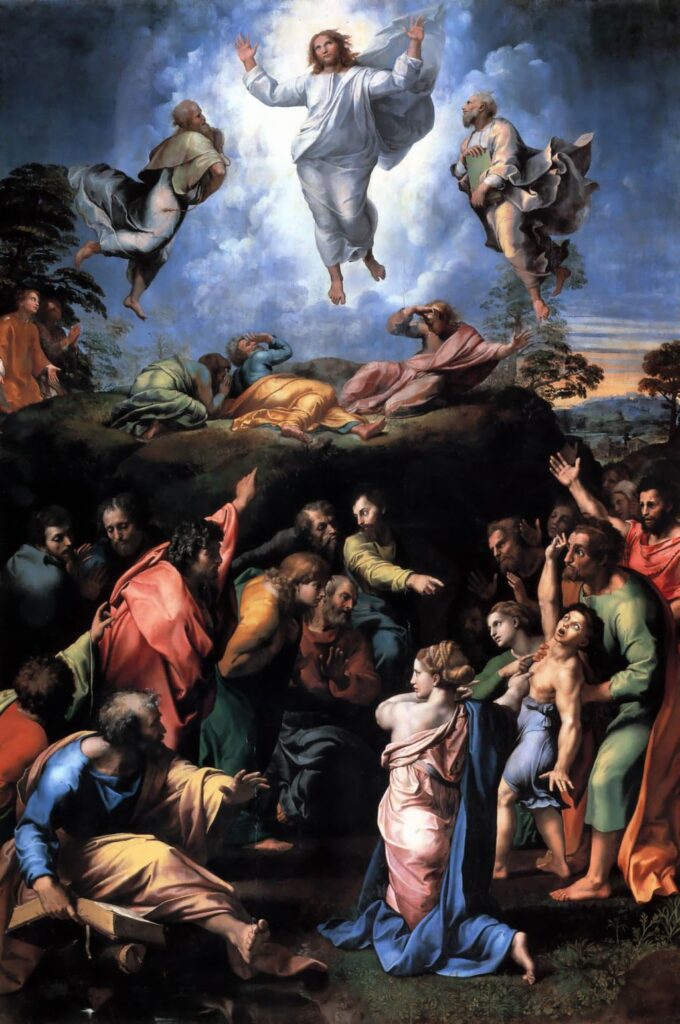Jeff Garrison
Bluemont and Mayberry Churches
August 21, 2022
Luke 9:37-45
At the Beginning of Worship:
What is the most faithful way to pray? Do we tell God what we want and need? Or do we turn to God with open arms and allow God to do what is best?
I supposed most people tell God what they want or need. I’m guilty. But when you think about it, it’s a bit arrogant to think we know better than the almighty. I’ve used this quote attributed to C. S. Lewis many times. “We’ll spend the first half of eternity thanking God for prayers not answered.” God knows best. Perhaps our best prayers are those we turn ourselves over to God saying, “Thy will be done.”
Before reading the scripture:
Last week we looked at the Transfiguration in Luke’s gospel. Interestingly, Luke gives us more insight into the conversation between Jesus, Moses, and Elijah than the other gospels. But even here, we are provided only a glimpse of what was said. They talked about what was going to happen in Jerusalem. Afterwards, Jesus and the disciples come down the mountain and are immediately surrounded by crowds including a desperate father. Here, unlike Matthew and Mark, we’re given a brief account of the story. Having just witnessed Jesus’ glory, we now learn of the disciples’ limitations. But we also learn that despite their inability to help this man, Jesus still comes through.
In preparation for hearing the scriptures, I will pray a prayer the great Scottish Reformer, John Knox, used before worship:
O God of all power, Who hast called from death the great Pastor of the sheep, our Lord Jesus, comfort and defend the flock which He hath redeemed by the blood of the eternal testament; increase the number of true preachers; mitigate and lighten the hearts of the lost; relieve the pains of the afflicted, especially those that suffer for the testimony of the Truth, by the power of our Lord Jesus Christ. Amen.[1]
Read Luke 9:37-45
Raphael’s Transfiguration

The Vatican, image in public domain
The last artwork by the great renaissance painter, Raphael, was of the Transfiguration. We explored that story last week. But the artist includes in his depiction not only the wonderous and glorious events on the mountain, but also the inability of the nine disciples left behind to help the man whose boy was demonically possessed. The contrast with the glory above and the struggle and defeat below are striking. Jesus dazzles in the center of the canvas, while all is dark and foreboding below.[2] On our own, our abilities are limited, something Raphael captures on canvas.
Similarity to the Gerasene Demonic story
Our story today has some resemblance to the story we examined a month of so ago, just after Jesus calmed the storm on the lake. If you remember, a demonic man met Jesus on the other side.[3]The man was a terror to everyone. Filled with demons, they tried to kill him. Jesus casts the demons out of the man and into a herd of pigs who ran off a cliff into the water and drown. Evil does that. Destruction is its goal. But once the man was freed from the demons, he became a disciple. He went on to tell everyone what Jesus did for him.
Setting for Today’s Story
In today’s story, Jesus has just come down from the mountain. He’s met by a crowd, including a man who only one child, a boy, who had issues. Luke appears to have a special heart for parents with only one child, as this is the third such encounter in his gospel.[4]
It sounds like this boy may have some form epilepsy. I don’t know if you’ve ever been around someone with such seizures. They lose control.
Ken, a friend from Japan who was in my seminary class, had epilepsy. He once had a seizure in chapel. Thankfully, several of us knew what was happening. There was not much to do but try to keep him safe and to put a wallet in his mouth to keep him from biting himself or swallowing his tongue as we waited for paramedics.
But back in the first century, epilepsy was blamed on demonic possession.[5] So, instead of making speculations or a medical guess as to the boy’s problems, we’ll stick to how the story is told. The boy goes off into fits. His father can’t control him. You can imagine the chaos in their home. As it is with evil, whenever it takes over this boy, it tries to harm him. The disciples, whom Jesus had given power to heal,[6] can’t help the boy.
When Jesus hears the boy hasn’t been helped, he goes off on a triad about this perverse generation. He sounds like an Old Testament prophet. However, in Luke, Jesus doesn’t blame the disciples for their inability to help.[7] “Human doubts and disbelief are not the last word,” one commentator writes. “Nor do they determine Jesus’ willingness or ability to act.”[8]
Jesus takes pity on the boy and his father. He calls for the boy to be brought to him. Just as the man by the lake went berserk upon seeing Jesus, the boy immediately goes into convulsions.
The demon’s reaction to Jesus (and the good)
Imagine my dog going to the veterinarian. It’s for her good, but she’ll throw a fit before I can drag her out of the car. I suppose I’m like that with dentists. It may be for my own good, but that doesn’t mean I like it (although I don’t generally throw a fit). In a similar way, the demon fears encountering good and tries to harm the boy one last time. So, the boy convulsions before Jesus.
But Jesus’ power is greater. He heals the boy, and then hands the boy back to his father. This amazes the crowds. They praise God’s greatness and what Jesus has been doing.
Jesus’ changes subjects
Then Jesus changes subject. Luke tells us that Jesus prepared his remarks by telling people to “let these words sink in.” Their excitement over his healing the boy focuses their attention on Jesus’ acts and not his words.
Luke gives us three possible reasons for this. They don’t comprehend what Jesus means when he speaks of being betrayed. Or, as the next verse implies, the meaning was concealed from them (kind of like pharaoh’s heart being hardened[9]). Or they didn’t want to hear such negative news at such a joyous time, so no one asked any questions.[10] In other words, why ruin a good party with bad news. Why rain on a parade.
Today’s truths:
What does our text say to us today? There are at least two truths we should understand. First, we should trust God to do what is right. The boy’s father didn’t tell Jesus to cast out the demon. He just begged for Jesus to look at his son. The man trusted Jesus’ goodness. He knew Jesus would see the boy needed help and so respond.
When we are sick, do we go to the hospital and then direct the physicians on how to treat us? In most cases, that’s not a good idea. Instead, we trust they have our best interest in heart. In addition, we trust their knowledge. Likewise, we trust God wants what is best for us. It’s like the father character played by Robert Young in the 1950s classic sitcom, “Father Knows Best.” We trust God the Father. Faith is having trust!
Second, which builds on the first, we are reminded that we can’t see or understand everything. We’re not God. Sometimes we get so caught up in the excitement that we are unable to see what’s around the corner. Or we don’t want to see, especially when we know its bad. Again, it comes down to trust in God.
Conclusion
Jesus knew his mission. As we saw last week with the story of the Transfiguration, Jesus talks about his Jerusalem mission with Elijah and Moses. Jesus was preparing himself for what’s ahead. And it was going to be hard to accept and understand, but in the long run, what Jesus did was for us. And because of his atoning death, our future is much brighter. We are loved. We can find forgiveness and be adopted into God’s family. And that’s good news!
Don’t make demands upon God in your prayers. Instead, trust God, know that you are loved, and have faith. Amen.
ã2022
[1] Howard L. Rice & Lamar Williamson, Jr., A Book of Reformed Prayers (Louisville, KY: Westminster John Knox Press, 1998), 21.
[2] Norval Geldenhuys, The Gospel of Luke (Grand Rapids, Eerdmans, 1983), 284. For more information on the painting along with a reproduction of it, see https://en.wikipedia.org/wiki/Transfiguration_(Raphael) v
[3] Luke 26-39. See my sermon at https://fromarockyhillside.com/2022/07/from-demon-possessed-to-gentile-evangelist/
[4] James r. Edwards, The Gospel According to Luke (Grand Rapids: Eerdmans, 2015), 286. See Luke 7:12 & 8:41-2.
[5] Edwards, 286. See also Matthew 17:15, 18-19 for insight into the linking of epilepsy and demon possession.
[6] Luke 9:1-2.
[7] In the other gospel accounts, the disciples ask Jesus why they failed, and he uses it as a lesson for faith and prayer. See Matthew 17:14-21 and Mark 9:14-29.
[8] Edwards, 286.
[9] Exodus 4:21, 7:3, 7:13-14, etc.
[10] Fred B. Craddock, Luke: Interpretation: A Bible Commentary for Teaching and Preaching (Louisville, KY: John Knox Press, 1990), 136. Craddock suggests that the voices of praise of the crowd over Jesus’ power makes it hard for the disciples to see Jesus both in power and, in Jerusalem, in powerlessness.


Thanks for another excellent sermon. Luke 9:37-45 stitches together two stories which on first look seem quite different, but you tie together interestingly and excellently.
Thanks, Rick!
I don’t ask for help because I’m so used to relying on myself for everything.
While self-reliance is a good thing to a certain limit, I think humans were created to need and depend on others.
I often think of the Lincoln line on this subject:
“Sir, my concern is not whether God is on our side; my greatest concern is to be on God’s side, for God is always right.”
I love the humble wisdom of that sentiment.
Lincoln, who never really joined a church, was a good theologian. His 2nd Inaugural Address is probably the most theological political speech ever. One of my professors from way back, Ron White, wrote a book on it.
Having faith is getting harder these days, Jeff, but I am doing my best.
Lean in and trust!
I rarely ask for help because I do trust him to know better than I, but sometimes, I can’t stop myself. Then I bargain! That’s probably not a good idea at all.
Bargain is also something we all do from time-to-time. But when we catch ourselves, we learn and grow!